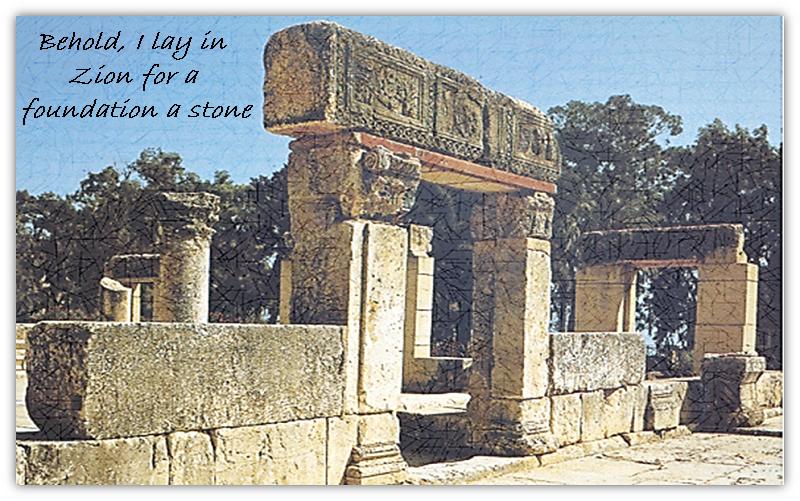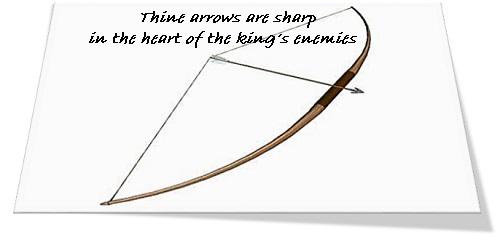What's in a Name
What's in a Name
Read Zechariah 10:4

The names of God are more than simply labels: they are means by which God reveals something about His person, His perfections, and His work. They both identify and describe. And what is true about the names of God generally is true about the names of Christ specifically. The Old Testament contains many names or titles of Christ that draw attention to a particular aspect of His person or His work. The use of these special titles for Messiah was an effective way for advancing knowledge about Him in the Old Testament dispensation and an effective way for teaching us about Christ in this dispensation, because He is the same yesterday, today, and forever. So if we can find the titles of Christ in the Old Testament, we have found Him and we will learn important lessons about Him.
The book of Zechariah is one the most intensely and explicitly messianic of all the prophets. We could indeed well refer to the book as the Gospel according to Zechariah. There is hardly an essential truth about Christ’s person or work not addressed in this little prophecy. Zechariah 10:4 is one of those key messianic texts that identifies Christ, and it does so with a series of descriptive terms. These are common nouns or expressions used for personal designation. The technical term for this is an appellative, a common noun used as a descriptive name, like referring to your minister as “Pastor.” Because they are common nouns, they may not always be immediately recognizable but they are always instructive.
Out of him came forth the corner, out of him the nail, out of him the battle bow, out of him every oppressor together.
The person described in Zechariah 10:4 is God’s answer to the bad shepherds (rulers) who had troubled the flock of His people (10:2-3). The Lord of hosts would visit His people and reverse their fortunes. The agent by whom the bad shepherds would be punished and the flock blessed is the corner, the nail, the battle bow, and the absolute ruler. The statement “from him” (from the Lord) precedes each of these four titles, suggesting the divine anointing and commission of the Messiah to conduct His ministry.
Corner⤒🔗
That Christ is the Corner testifies to His being the sure and stable foundation. This same word occurs in Isaiah’s more extensive description: “Behold, I lay in Zion for a foundation a stone, a tried stone, a precious corner stone, a sure foundation: he that believeth shall not make haste” (Isa. 28:16). Likewise, it is the word in Psalm 118:22: “The stone which the builders refused is become the head stone of the corner.” The New Testament demands the Christological interpretation (see Matt. 21:42; Acts 4:11; 1 Peter 2:4-8). In contrast to the vain and worthless objects of trust mentioned in Zechariah 10:2 (idols, diviners, dreamers), from the Lord would come the Corner, the only trustworthy object for faith. That was true then and it is true now. The object of faith determines the value of faith, and the only object of saving faith is Christ.
Nail←⤒🔗
That Christ is the Nail testifies to His ability to bear the load in supporting His people. This nail is a peg in the wall for hanging items. Unless the peg is solid, it will be useless for hanging anything. Ezekiel plays on this thought when he says that the “wood” of a vine would be a worthless pin for hanging vessels (Ezek. 15:3). Isaiah’s report of Eliakim’s promotion to administer the keys to David’s house illustrates this function of the nail: “And I will fasten him as a nail in a sure place ... and they shall hang upon him all the glory (weight) of his father’s house” (Isa. 22:23-24). Sadly, Eliakim’s nail loosened and the burden hanging on it fell off (Isa. 22:25). This failure of what seemed to be a sure support points to the fact that there is only one Nail that is strong enough and sure enough to hold any burden. That unfailing Nail is Christ. In contrast to the bad shepherds who took advantage of and increased the burden of the people, the Lord would fix an immovable Nail that would hold up under any weight and load. It is good to know that not only did Christ bear the load of our guilt and sin, but that He is ever able to bear the load of our troubles and cares. We can hang it all on Him.

Battle Bow←⤒🔗
That Christ is the Battle Bow testifies to His being the active champion and warrior for His people. This highlights that aspect of His mediatorial kingship in which He subdues and conquers all of His and our enemies. The Psalmist speaks of the same activity in that great royal and messianic Psalm 45: “Thine arrows are sharp in the heart of the king’s enemies; whereby the people fall under thee” (Ps. 45:5). This kingly behavior is on the surface of the Zechariah text. It is this divinely sent Battle Bow that will execute God’s anger against the bad shepherds and punish the goats. Certainly, the final manifestation of this warrior King will come when He rides in on that white horse with a sharp sword in His mouth to smite the nations (Rev. 19:12-15). In the meantime, Christ is the able and unfailing defender of His people.
Absolute Ruler←⤒🔗
That Christ is the Absolute Ruler testifies to His certain sovereignty. The translation of this last line is notoriously difficult. The word the Authorized Version translates as “oppressor” is the word I am focusing on when I say that Christ is the absolute Ruler. There is no question that the word designates a ruler, and many occurrences of the word in the Old Testament refer to hard taskmasters or slave drivers who would use any means to force their subjects into compliance. This explains the translation “oppressor.” However, I would suggest that the word itself simply defines one who has ultimate authority over another. The character of the ruler determines whether his rule is cruel and oppressive. The parallelism with the other three expressions demands that this title refer to the same person. Therefore, the Ruler with absolute authority over His subjects is Christ. His rule is not oppressive, but it is absolute nonetheless. This is a most fitting designation of Christ in the immediate context. The people knew well the oppression of the bad shepherds (rulers). What a relief it would be to know the kind despotism of the Messiah King. Submitting to the absolute authority of Christ is always a relief; moreover, it is the wise thing to do. He will rule either by grace or by the rod of iron. The advice of Psalm 2 is appropriate in view of this absolute rule of Christ. “Kiss the Son, lest he be angry, and ye perish from the way, when his wrath is kindled but a little. Blessed are all they that put their trust in him” (Ps. 2:12). If He is the Absolute Ruler, it is best to be a citizen rather than an enemy of His kingdom. That was true then; it is true now.
So, what’s in a name? When the name belongs to Jesus, what we need to know for life. It is the only name “whereby we must be saved” (Acts 4:12) and “before which every knee will bow” (Phil. 4:10).

Add new comment